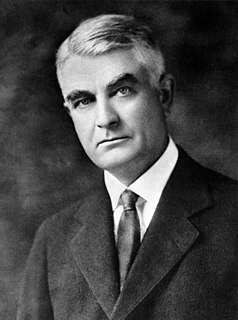A Quote by Gilbert K. Chesterton
Related Quotes
Experience hobbles progress and leads to abandonment of difficult problems; it encourages the initiated to walk on the shady side of the street in the direction of experiences that have been pleasant. Youth without experience attacks the unsolved problems which maturer age with experience avoids, and from the labors of youth comes progress. Youth has dreams and visions, and will not be denied.
All that remains to the mother in modern consumer society is the role of scapegoat; psychoanalysis uses huge amounts of money and time to persuade analysis and to foist their problems on to the absent mother, who has no opportunity to utter a word in her own defence. Hostility to the mother in our societies is an index of mental health.
We have to recognize we've got some big problems on race, just like we got still big problems on crime, just like we got big problems on just about everything. But we also have to make sure that we've - draw confidence from the progress that we have made, 'cause otherwise, you get into this cycle of cynicism.
The rationale for accepting or rejecting any theory is thus fundamentally based on the idea of problem-solving progress. If one research tradition has solved more important problems than its rivals, then accepting that tradition is rational precisely to the degree that we are aiming to "progress," i.e., to maximize the scope f solved problems. In other words, the choice of one tradition over its rivals is a progressive (and thus a rational) choice precisely to the extent that the chosen tradition is a better problem solver than its rivals.
I think that we are in a position to continue to make progress, but it's gonna require us to both recognize what the problems are, also recognize the progress we've made. Last point I'd make on this, since we're on criminal justice: During the course of my presidency crime has been the lowest it's been probably since the '60s.
In recent years our knowledge of modern technology has increased considerably, and as a result we have witnessed remarkable material progress, but there has not been a corresponding increase in human happiness. There is no less suffering in the world today, and there are no fewer problems. Indeed, it might be said that there are now more problems and greater dangers than ever before.




































